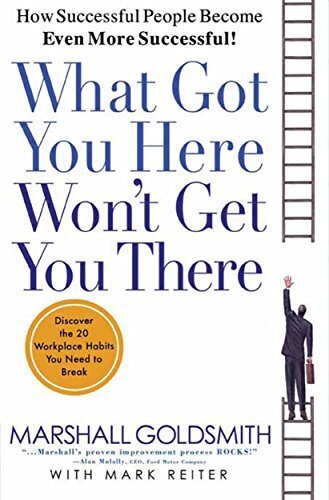I think that every company has one core value that is sort of controversial — brutal honesty is ours. Our core value, “Brutal Honesty” was added into our values based on how we interact. We are extremely direct and unafraid of having challenging conversations. Part of this is due to the personalities of the founders, and part of this is due to the “Promote Life Outside of Work” value — we simply don’t want to waste time sugar-coating the truth.
Taking Feedback
Receiving feedback is a learned skill that can be hard for many of us. The first time we receive anonymous feedback via a 360-degree peer review is something that many don’t forget. Yet, it’s exactly our ability to take that feedback and then adapt which leads to personal improvement. Years ago I read a great book “What Got You Here Won’t Get You There” authored by executive coach Marshall Goldsmith, that discussed the process of receiving feedback. 
The Truth Hurts
I, like many others, can be very hard on myself. When someone points out a problem that I’m fully aware of, and yet have neglected to address, it drives me crazy. It’s as if the person sees an open wound and is purposefully driving a knife into it. I realize that the person probably didn’t intend to drive a knife into anything, and I’m also fully aware that I have this wound and that I am likely leaving it untreated. So, while I invite critique, it can still be tough. It’s easy to get defensive. And, even when we realize the criticism is accurate, as they say, “the truth hurts.”
Now, brutal honesty does NOT need be delivered in a mean way. Brutal Honesty is not permission to demean or be an asshole. Brutal honesty clearly has a dark side: the opportunity to criticize the person versus the idea.
The Idea- Not the Person
A key part of this value is to ensure that honesty is directed towards the idea — not the person. “Don’t shoot the messenger” is an oft-quoted idiom, but it is sometimes incredibly hard to decouple principles from the originator. One technique to improve on this is the “Fist of Five” which came from the Agile community as a way to gain consensus. Essentially you ask the question whether people support an idea and, all at the same time, everyone votes by holding up 1 to 5 fingers. If someone does NOT support the idea (lower than a 3), you ask “What would make you a 3?” This constructively focuses the conversation, not on whether someone agrees or disagrees, but on what it would take to gain agreement.
Another cool technique (this time coming from the improv community) is to think and respond using “Yes, and” instead of “No, but.” Think about the times you say “No, but” and consider how it removes creativity from the room, shuts down discourse, and creates a confrontation. “Yes, and” builds and improves on existing ideas and indicates that the original idea (and person) was valued.
Work in Progress
We recently had an amazing outside consultant (thank you Nancy) survey our culture. She highlighted brutal honesty as a value that needed attention. Some individuals expressed a concern that brutal honesty “carries a title.” This was good (and brutal) feedback for the executive team to hear as it could not be further from the intention of this value. So we need to work on this. Brutal honesty applies to everyone at all levels. We’ll continue to find ways to provide examples and encourage this core value.


